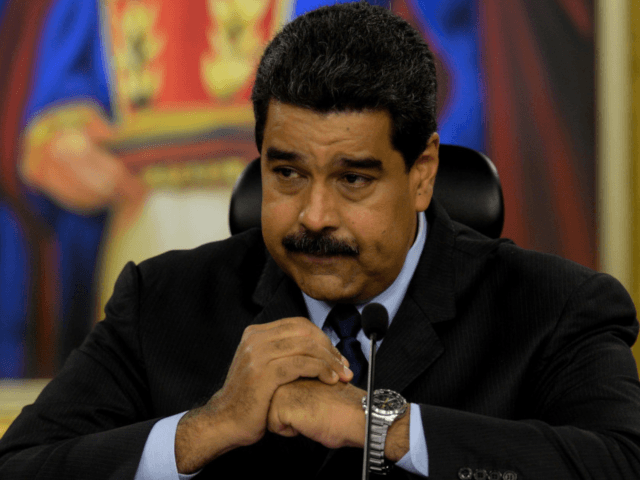The International Monetary Fund (IMF), of which the U.S. is the dominant stakeholder, confirmed on Thursday it had suspended its work with the anti-American socialist regime of Nicolás Maduro since the end of January due to the South American nation’s financial woes and deteriorating political and humanitarian conditions.
IMF officials noted that the international body can no longer evaluate the “quality” of the data released by the Latin American nation’s central bank.
Maduro ceased to legally be president of Venezuela in January following the expiration of his term. The current president of Venezuela is Juan Guaidó, sworn in constitutionally by the country’s National Assembly.
“We cannot offer a view on data quality as we have not had the opportunity to make a full assessment in the absence of contacts with the authorities,” Gerry Rice, a spokesman for the IMF, said, Reuters reported on Thursday, adding:
Maduro has repeatedly dismissed the IMF as an agent of U.S. colonialism and criticized the institution for leading harsh austerity programs in developing countries.
China, which has for years sought to increase its influence within the IMF, had pressured Maduro’s government to release the data, according to two sources with knowledge of the matter.
One of the sources said China had hoped releasing the data would help bring Venezuela into compliance with the IMF, making it harder for the institution to recognize Guaido.
Rice indicated the Maduro data is unreliable, showing the same economic contraction of 22.5 percent in the third quarter of 2018, compared to the same period in 2017, despite the deteriorating financial conditions that continue to plague the country. IMF officials suggested the contraction is likely much worse.
The spokesman also indicated Maduro officials are likely manipulating figures of gross domestic product and inflation.
Last year, the IMF chastised Venezuela with a “declaration of censure” for not reporting timely and accurate economic data, such as gross domestic product and inflation.
The measure was reportedly a warning to Caracas that it could be banned from voting on IMF policies and, eventually, expelled unless it resumed timely and accurate notification of its economic data.
In explaining its decision to suspend its work with Maduro in January, the IMF suggested it could no longer rely on the figures provided by the Maduro regime following Guaidó’s ascent to the presidency.
Noting that a military option is on the table to push Maduro out, the U.S., backed by nearly 50 countries, has come out in support of Guaidó’s interim presidency. Maduro and Guaidó have engaged in negotiations in recent months to no avail.
The socialist successor of Hugo Chávez, the self-styled leader of the socialist “Bolivarian Revolution” remains in power, courtesy of the support of Russia, China, and to a lesser extent, Iran and its Hezbollah narco-terrorist proxy.
The U.S. military has long warned against the growing presence of American rivals Russia, China, Iran, and Hezbollah in Latin America, noting that Venezuela’s permissive environment has allowed them to thrive in the region.
On Thursday, Reuters reported:
The International Monetary Fund said on Thursday it had not pressured Venezuela to release economic indicators after years of silence, while two sources said the country’s surprise data release this week was due to pressure from China.
The central bank [of Venezuela] on Tuesday unexpectedly released data confirming Venezuela is suffering hyperinflation and massive economic contraction. The release reversed President Nicolas Maduro’s unofficial policy of classifying economic indicators as state secrets.
U.S. President Donald Trump’s administration has heavily sanctioned Maduro and his supporters to convince them to relinquish power to no avail.
The Trump administration has not ruled out military action to oust Maduro despite warnings against the move from Russia and China.
Once one of the wealthiest oil-rich nations of Latin America, the policies of the late dictator Chávez and his successor have plunged the South American nation into insecurity and a political and humanitarian crisis, forcing hundreds of thousands to flee. Those who stay behind are facing devastating poverty and hunger.
In March, the IMF declared that it was awaiting guidance from member countries on whether to recognize Guaidó as Venezuela’s leader.
As the two largest economies in the world, the United States and China, a Venezuelan ally, are important IMF members.

COMMENTS
Please let us know if you're having issues with commenting.